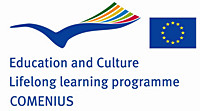 Comenius projects at the BKCR
Comenius projects at the BKCR
Here summaries of the most recent Comenius projects we took part in.
Sections on this page:
-
Comenius project "Developing Entrepreneurial Skills In and Beyond the Classroom" (2011-2013)
-
Comenius project "Developing Co-operative Leadership through Entrepreneurial Skills" (2009-2011)
-
Comenius project "Developing Entrepreneurial Spirit in European Teachers’ Training for Vocational Education - Teach&ESPRIT" (2004-2007)
Developing Entrepreneurial Skills In and Beyond the Classroom (DESIC, 2011-2013)
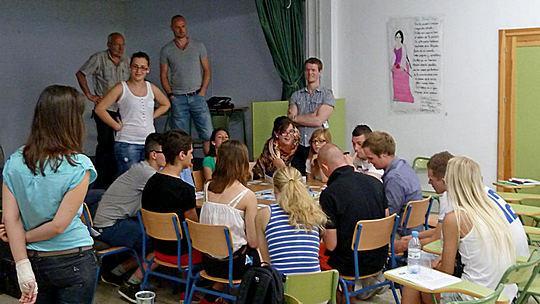 This project was a cooperation between five schools from Denmark, France, Germany, Spain and Sweden.
This project was a cooperation between five schools from Denmark, France, Germany, Spain and Sweden.
Magdalena Fohrmann of the BKCR was main coordinator and organizer of this project.
The underlying idea behind this was that in the future, Europe has to be innovative in order to face global challenges successfully. It is important to be proactive on all levels: nationally, locally, institutionally and individually.
The aim of the project was to develop entrepreneurial skills in and beyond the classroom, as to increase all stakeholders' abilities to promote innovation and change within their own schools. It was designed to be adaptable to a multitude of courses and subjects allowing us to encompass all of secondary education.
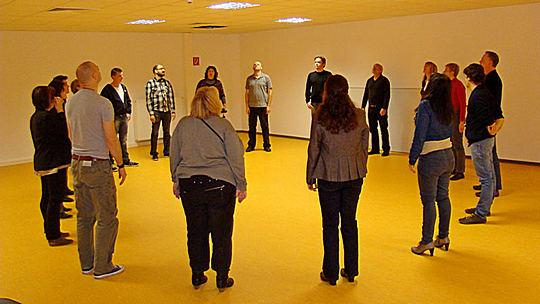 To achieve this, all stakeholders (students, teachers, headmasters, government, economy) need to be actively involved, to collaborate and to communicate.
To achieve this, all stakeholders (students, teachers, headmasters, government, economy) need to be actively involved, to collaborate and to communicate.
The project involved an international teacher conference in Germany to design and test scenarios for acquiring entrepreneurial skills, a student workshop in Spain with groups of students from all the participating schools and a panel discussion in Denmark with participants representing politics, economy, parents and teachers. The panel discussion was also broadcasted to students on the Internet who could give feedback and ask questions.
It was a very successful project, since the various approaches to teaching in the respective countries helped us to conceive new and innovative ideas that went beyond national limits.
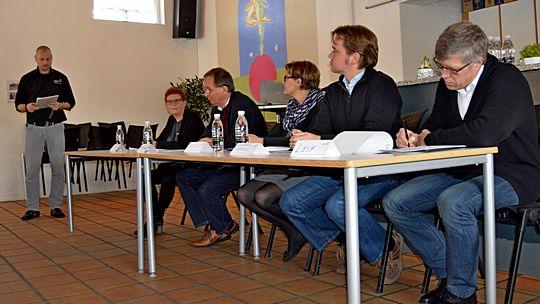 Also the students who had the opportunity to take part in the student workshop in Spain benefitted vastly from this experience, attained entrepreneurial skills, formed friendships across borders (especially facilitated by social networks), acquired a new and broader view to life, (re-)shaped their future plans and gained courage to go beyond borders.
Also the students who had the opportunity to take part in the student workshop in Spain benefitted vastly from this experience, attained entrepreneurial skills, formed friendships across borders (especially facilitated by social networks), acquired a new and broader view to life, (re-)shaped their future plans and gained courage to go beyond borders.
The resulting learning scenarios have been announced to all BKCR teachers at a faculty conference, subsequently made available to all BKCR teachers, and incorporated into the BKCR's curriculums during professional days for the faculty.
For further information on this project you can refer to the project's website. The whole project is documented online on the project's website which can be found at www.desic.eu
Developing Co-operative Leadership through Entrepreneurial Skills (COOPLEAD, 2009-2011)
This project was a cooperation between four schools from England, France, Germany and Italy.
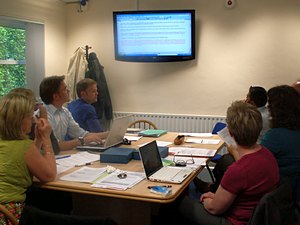
The basic idea was that a school that wants to promote entrepreneurial skills like personal responsibility, autonomous thinking and action, endurance, being able to work in a team, being able to communicate, etc. has to demonstrate these also in its own institution's structures.
But not only the school itself is involved in this endeavour: Also parties like school supervisory boards, school authorities and headmasters have to facilitate and support this approach. Co-operative leadership structures and entrepreneurship belong together.
Each stakeholder in the system of a school has to regard himself/herself as an entrepreneur as well as a leadership figure. This entails the need for leadership skills, not only for the headmaster but for every teacher (they have to be managers of their classrooms). We believe this is also true for students, because they are responsible for their own thoughts and actions and need to be enabled to lead other people as preparation for later life, both inside and outside their future jobs.
Developing Entrepreneurial Spirit in European Teachers’ Training for Vocational Education (Teach&ESPRIT, 2004-2007)
This project was a cooperation between schools and unversity departments from Cyprus, the Czech Republic, Germany and Norway. The project coordinator was the EU Service Centre for Trade and Vocational Education of the Münster District Administration.
The aim of Teach&ESPRIT was the development of a European concept for teacher training and further education for the so-called “entrepreneurship education”, i. e. the mediation of entrepreneurial initiative in education. This was achieved by a transnational partnership of institutions which created modules for entrepreneurship education in vocational training, teacher training and further education. The target group of these modules are teachers of vocational education or teachers in their second phase of their education. The modules were evaluated in the course of a project. The results of Teach&ESPRIT were disseminated nationally and internationally.
The established modules clearly demonstrated the nature of entrepreneurship with their emphasis on networking, self-management, ethics and the teacher’s new role. The modules can be used in school, but they also serve the purpose of showing how entrepreneurial spirit can pervade classroom material, thereby letting teachers know how they can alter their teaching or carry on or strengthen entrepreneurial ideas they already have incorporated in their daily work. Therefore the project work was both innovative and supportive of previously existing teaching ideas.

